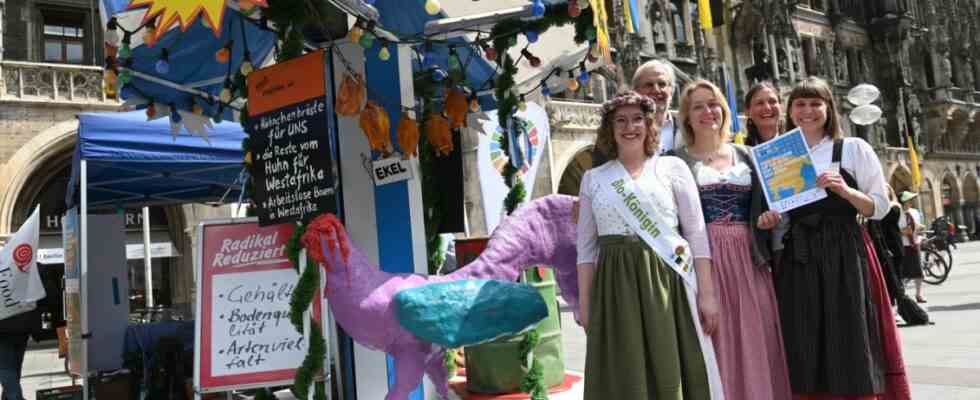Oktoberfest fans look forward to two things all year round: the first beer at the Wiesn, which always tastes very special, and the first chicken, which then makes you thirsty for the second beer. In this respect, this demo on Wednesday afternoon at Marienplatz could be an advertising event for the Oktoberfest, for which the many women in dirndls and the colorful children’s carousel speak. However, the title – “Hendlsauerei” – points to a completely different goal: the aim is to explain the industrial intensive animal husbandry from which the vast majority of Wiesnhendl come. And the City Council is being asked to do something about it.
30 civil society organizations, from the Munich Sustainability Initiative (MIN) to the Nutrition Council and Slow Food to various organic farming associations, have joined forces to end this “chicken mess”. The Oktoberfest with its almost 440,000 eaten chickens is just one example, actually. But just one that attracts a lot of attention. Here you can see a “lighthouse project” that can be used to point out sustainable, climate-neutral nutrition. Helmut Schmidt from the MIN coordination group, formerly the city’s second plant manager responsible for waste management, says: “Our food system makes you ill, and the city’s climate policy is ambitious, but incomplete because it doesn’t take care of the damage caused by over Consumption and nutrition emerge.” That should change now. Schmidt is confident, after all, he was told 31 years ago that the reusable rule could never be introduced at the Oktoberfest: “And it still works today.”
Roast chicken from industrial intensive livestock farming has many disadvantages. The animals are kept in a very small space and fattened up to slaughter in less than 30 days. Because the breast and thighs are the most popular parts, they are overbred. As a result, the chickens can hardly move and their bones often break on their own. Because the animals are often very susceptible to disease, they are treated with antibiotics on average three times in the course of their short lives, and spread across the board. That’s not healthy.
Wiesnhendl should come from organic production in the future
The 30 initiatives therefore demand that the city must ensure that Wiesnhendl can only come from organic production in the future – so far this has only been the standard for a chicken roastery. After all, Munich has committed itself to climate neutrality, which should be achieved in 13 years. By 2035, the Wiesnhendl would also have to come from organic farmers. And not only that: By then, all the food at the world’s largest folk festival should come from organic production.
The invited city hall politicians saw good chances for this. “The Wiesn could be a role model,” said Julia Schmitt-Thiel (SPD), “I would be in favor of only selling organic food there”. Mona Fuchs from the Greens praised “the realistic approach, because it would not be possible to change something overnight. It would be best if you also got the economic advisors and the big breweries on board.” Because the eight large brewery tents at the Wiesn are set and are not evaluated like normal applicants according to the city’s fulfilled criteria. Nicola Holtmann (ÖDP) also found that more renewable energies should be used at the Oktoberfest in the future: “There should be a higher number of points for that.”
The politicians were then also given a task book, a comprehensive list of demands for a more sustainable Oktoberfest. Among other things, a round table still to be set up made up of local politicians, the municipal departments involved and Oktoberfest landlords is to work out solutions.

